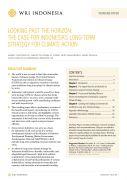Melintasi Horizon: Studi Strategi Iklim Jangka Panjang untuk Masa Depan Indonesia

Ringkasan
Indonesia sedang berkembang pesat. Di sisi lain, Indonesia terus menghasilkan emisi gas rumah kaca (GRK) dan merupakan salah satu penghasil emisi terbesar di dunia. Indonesia telah berkomitmen untuk mengurangi emisi GRK sebesar 29 persen hingga 41 persen pada tahun 2030. Namun, saat ini Indonesia belum memiliki rencana dekarbobisasi jangka panjang. Tanpa rencana jangka panjang, pertumbuhan Indonesia akan menghadapi berbagai risiko yang tidak dapat terlihat dalam perencanaan jangka pendek. Untuk memenuhi kepentingan nasional Indonesia, perlu dikembangkan strategi aksi iklim jangka panjang (Long Term Strategy, LTS) yang melampaui 5-10 tahun ke depan; yang akan mendukung pencapaian tingkat pertumbuhan yang dibutuhkan dengan mempertimbangkan kondisi dan risiko yang akan muncul setelah tahun 2030.
Kertas kerja ini memberikan gambaran awal terkait manfaat dan urgensi penetapan strategi jangka panjang (SJP) aksi iklim di Indonesia dan menyoroti berbagai peluang yang ada saat ini untuk pengembangan strategi yang efektif. Secara khusus, kertas kerja ini membahas pertanyaan-pertanyaan berikut:
- Seberapa mendesakkah strategi iklim jangka panjang harus dikembangkan oleh Indonesia?
- Di mana posisi Indonesia saat ini dalam proses pengembangan strategi iklim jangka panjang?
- Pelajaran apa yang dapat diambil dari pemodelan emisi jangka panjang yang sudah dimiliki Indonesia?
- Seperti apa bentuk lanskap kelembagaan yang dapat mendukung SJP yang efektif?
- Apa saja faktor pendukung yang diperlukan untuk membentuk SJP yang efektif?
Temuan Utama
Publikasi ini untuk sementara hanya tersedia dalam Bahasa Inggris.
- There is an urgency for Indonesia to develop an LTS for climate action. It makes economic sense: it could protect Indonesia from long-term costs, it gives Indonesia a chance to direct its land-use and energy systems more efficiently, it gives certainty to long-term investments, it safeguards Indonesia’s growth from risks associated with climate change, and it could potentially bring Indonesia toward becoming a sustainability global leader.
- The priority for Indonesia’s LTS is to evaluate and improve Indonesia’s energy system and land use. For the energy system, thinking long-term could inform a power plant expansion strategy to reflect global trends and technology, avoid locking in high cost infrastructure, and minimize potential stranded assets. As for land use, an LTS could help improve the country’s land use management approach and inform the extent to which Indonesia could continue to exploit lands. Consideration should be given to more ambitious protection of Indonesia’s pristine forests and peatlands, which protect Indonesia from future economic losses associated with fires, build resilience to tomorrow’s climate, and act as a low-cost and less technology-reliant climate change mitigation solution.
- Indonesia’s Ministry of National Development Planning (BAPPENAS) has launched a low-carbon development initiative (LCDI) comprising efforts to mainstream low-carbon policies into development planning (Rencana Pembangunan Jangka Menengah Nasional; RPJMN). With modeling projections and scenarios until 2045 and with its link to the national policy planning process, the LCDI could be a basis for Indonesia’s LTS. Efforts should be made to ensure that the initiative closely involves other sectoral ministries and local governments.
- Lessons from existing long-term modeling studies show that Indonesia’s emissions will keep increasing, with major emissions to come from land use and the energy system. For land use, major drivers come from deforestation, peatland degradation, and forest fires. Drivers in the energy system mostly come from electricity.
- Understanding of the sources, causes, and trends related to climate change is closely related to the use of science and knowledge production for policy formulation. Co-creation and co-production of the LTS model with wider representation of nonstate actors is key to ensuring that the model captures the voices, substantive concerns, and assumptions of different groups.
Ringkasan Utama
Ringkasan eksekutif selengkapnya tersedia dalam kertas kerja.
Publikasi ini untuk sementara hanya tersedia dalam Bahasa Inggris.
- The world is not on track to limit the catastrophic impact of climate change. The United Nations Framework Convention on Climate Change (UNFCCC) calls on signatory countries to develop more ambitious long-term plans for climate actions by 2020.
- Indonesia’s self-interest would be served by a longterm strategy (LTS) for climate action that looks beyond the next 5–10 years; such a strategy could secure needed growth while considering conditions and risks beyond 2030.
- This working paper offers a preliminary overview of the benefits and urgency of producing an LTS for climate action in Indonesia and highlights current opportunities to develop an effective strategy. The assessment is derived from a review of the literature and interviews with experts and government officials.
- Some current initiatives can serve as a basis or Indonesia’s LTS, such as the low-carbon development initiative of the Ministry of National Development Planning (Badan Perencanaan Pembangunan Nasional; BAPPENAS), which includes long-term modeling exercises until the year 2045.
- An effective long-term climate strategy for Indonesia should have a durable, enforceable, and adaptable legal framework; high-level political commitment; cross-ministerial planning and collaboration; broad-based participation of various stakeholders; strong subnational ownership and capacity; and innovative and sustainable funding.